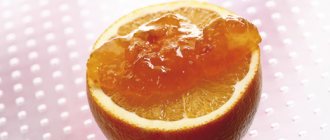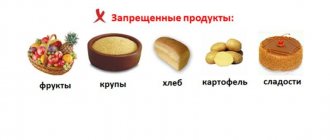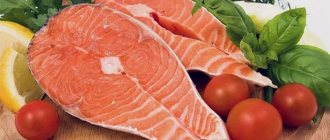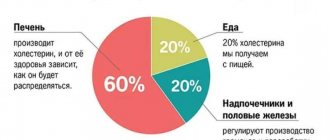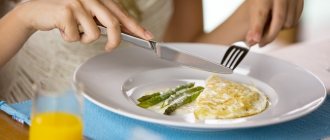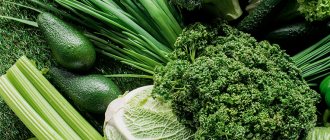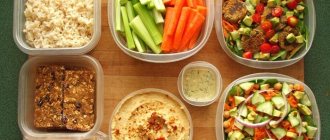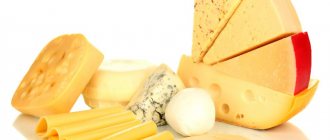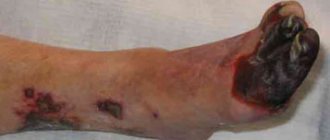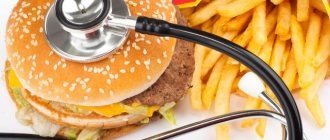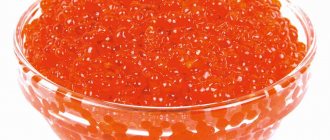An elevated level of cholesterol in the blood is the first harbinger of such an insidious and dangerous disease as atherosclerosis. Therefore, if indicators identified during the examination are outside the normal range, measures should be taken immediately to reduce them. A diet for high cholesterol is the best way to stop the development of the disease, tidy up blood vessels and cleanse the body of harmful substances.
Of course, not everyone can afford to suddenly give up their favorite sweets and fatty foods, but efforts should be made to prevent the dangerous consequences of high blood cholesterol and atherosclerosis. Today we will talk in detail about a nutrition plan to reduce the levels of “harmful” substances in the blood, permitted and prohibited foods, and a sample menu of healthy and healthy dishes.
General rules
Elevated blood cholesterol for atherosclerosis .
This fat-like substance is necessary for the formation of enzymes , hormones and other things. However, when its metabolism is disrupted and its level in the blood is high, irreversible changes develop in the wall of blood vessels - atherosclerosis, which is dangerous for its complications ( heart attack , stroke , disruption of the blood supply to various organs).
Dangerous in terms of the development of atherosclerosis is considered to be an imbalance between fractions - low-density lipoproteins LDL and high-density lipoproteins (HDL). The former have an atherogenic effect and their high content is a risk of cardiovascular diseases. High-density (“good”) cholesterol is produced by the body. Moderate physical activity promotes its production and at the same time reduces the accumulation of harmful substances, which only comes from foods.
Nutritional therapy has been developed to reduce cholesterol levels. A diet for lowering blood cholesterol levels can be used in the treatment and prevention of diseases - it is suitable for people who monitor their health. Its goal is to improve lipid metabolism and weight loss. The main principle of this diet is the reduction of animal fat, which we get from meat, fatty dairy products, and simple carbohydrates. Polyunsaturated fats (their sources are vegetable oils and nuts), fiber and complex carbohydrates (we get them from vegetables, grains, bran) should predominate in the diet. It is the large amount of fiber that helps remove excess cholesterol from the gastrointestinal tract. The protein content in this therapeutic diet is within normal limits, and can be obtained by consuming a variety of legumes and lean meats.
The amount of bread is no more than 200 g per day; the use of dietary bran bread is also allowed. Salt and the amount of liquid consumed are limited to 1.2 liters. Dishes must be prepared without salt, but it is allowed to add salt to prepared food on the table. Vegetables are eaten raw or stewed, and it is better to boil (bake) meat and fish to reduce fat in the diet. It is important to eat plenty of vegetables at dinner. Daily calorie content is 1400-1500 kcal.
Basic principles of nutrition for high blood cholesterol:
- Grains, vegetables and fruits, containing complex carbohydrates and high amounts of fiber, should make up about 60% of the diet. You need to eat 400 g of vegetables daily (one third fresh) and 200 g of grain products.
- The predominance of vegetable oils in the diet.
- Moderate consumption of permitted dairy products.
- Diet for high blood cholesterol includes fish, chicken and turkey, which are the foods of choice, and lean beef should take second place in the diet.
- The amount of salt is minimal.
- 2-3 eggs per week (unlimited protein).
- Avoid feeling hungry (have fruit snacks on time).
The diet for high cholesterol in women is no different from that for men and the general principles of nutrition remain the same. Total cholesterol in women and men should be no more than 5.2 mmol/l; a figure of 6.19 mmol/l is already considered significantly increased. HDL in women should be at least 0.9 mmol/l and up to 1.9 mmol/l; in men this figure is different - from 0.7 to 1.7 mmol/l.
The onset of menopause has an adverse effect on cholesterol metabolism and is explained by the fact that with the onset of menopause, estrogen decreases, and it regulates the production of “good” cholesterol. The increase in “bad” is facilitated by a woman’s sedentary lifestyle, overeating and consumption of fatty and high-calorie foods.
Diet for women with high cholesterol should contain as much as possible plant foods rich in phytosterols , which control and reduce the level of bad cholesterol:
- wheat germ;
- sesame seeds;
- sunflower seeds;
- flax seed;
- olive oil;
- grape seed oil;
- avocado.
Vegetables and fruits containing pectin : apples, citrus fruits, beets, watermelons and natural vegetable juices. Remember that all purple and red fruits and vegetables contain polyphenols that stimulate the production of good cholesterol: blueberries, strawberries, raspberries, cranberries, cranberry juice, chokeberries, lingonberries, pomegranate, purple and red grapes, plums, eggplants. Green leafy salads and vegetables are also useful: cabbage, lettuce, spinach, sorrel, artichoke and parsley, dill and green onions available to everyone.
It is imperative to include legumes in your diet, which, due to their high fiber content, will remove harmful cholesterol from the intestines. In terms of protein content, they can replace meat.
It is beneficial for older women to consume soy products containing phytoestrogens . Do not forget about proper culinary processing of meat and fish - a minimum of fat when cooking - it is best to bake in the oven, in pots or steamed.
Considering women's craving for sweets, it will be very difficult to give up sweet cream products, chocolate and sweets, pastries, cookies, waffles and limit yourself in sugar. But this must be done. Fatty meat should also disappear from the diet; you will have to give up processed meat (sausage, boiled pork). Pork, lard and bacon are prohibited. Don't forget about the need for physical activity. All this will only bring benefits - your tests will normalize, your weight will drop, and you will consider yourself attractive.
Often, high cholesterol is observed in diseases of the internal organs and endocrine system: nephritis , hypothyroidism , obesity , diabetes mellitus . This combined pathology requires a special approach to nutrition and more serious treatment. In each case, the issue is resolved individually and therapeutic nutrition is prescribed for the underlying disease. For example, what diet is indicated for high cholesterol due to kidney disease? In this case, you need to follow Table No. 7 and its variations. Diet 7 is prescribed for chronic kidney disease and, in addition to limiting salt and the amount of liquid you drink, it involves excluding foods rich in cholesterol (kidneys, liver, egg yolks, brains).
What can you eat
A cholesterol diet, which involves reducing this organic substance in the body, is based on the principles of consuming certain foods that help normalize the condition of blood vessels. It is necessary to provide a list of these products so that every person suffering from high cholesterol knows what is best to eat:
- Bran – Despite the fact that many people consider these grain by-products, bran contains a ton of fiber. In the fight against cholesterol, grain waste acts as follows: it prevents the absorption of harmful substances into the intestinal tissue. By regularly eating bran, you can reduce the “bad” substance in the blood by 7–15%;
- flaxseed - if a person consumes at least 45 grams of flaxseed daily, the cholesterol level in his body will drop by 8-10%;
- polyunsaturated fatty acids - replacing animal fats with vegetable fats is very useful for high levels of bad cholesterol. Products rich in such acids include olive and sunflower oil, avocado and others;
- garlic is an excellent helper in the fight against clogged blood vessels. The root vegetable contains substances that help reduce cholesterol by almost 13%;
- different types of nuts: walnuts, peanuts, pistachios. Not only are they able to cleanse blood vessels and the body of cholesterol accumulation, but while simultaneously reducing the amount of fatty foods consumed, they can reduce this figure by 8–10%;
- green tea is a cheap but healthy product, the healing properties of which are well known in the east;
- barley flour – it reduces the level of harmful substances in the blood by almost 8%.
Dark chocolate is no less useful for lowering cholesterol. Its ability to remove harmful substances is not as high as that of green tea varieties, but consuming a chocolate bar brings not only benefits, but also incomparable pleasure.
Authorized Products
Proper nutrition for high cholesterol should become the norm. What should it be? First of all, you need to exclude meat broths - prepare vegetarian soups; if this is difficult and unusual for you, then you can use weak secondary broth for first courses and carefully skim off the fat. Use potatoes in minimal quantities and it is better to prepare combined vegetable soups, cabbage soup and borscht.
Meat and poultry should be taken of lean types; poultry skin is unacceptable; additional fat should be trimmed from the meat. Since the diet involves limiting fat, the meat should be boiled or baked without adding sour cream, mayonnaise or any fat. Use vegetables as a side dish, not cereal. It is better to cook them for breakfast (oatmeal, buckwheat and brown rice).
Cabbage (all types), carrots, zucchini, pumpkin, eggplant, or salads made from fresh vegetables and green peas will help lower cholesterol levels. The total amount of vegetables eaten per day is at least 400g.
Use virgin vegetable oils to season ready-made dishes. omega-3 fatty acids, which regulate the production of beneficial lipids, is useful in this regard .
Lowering cholesterol levels can be achieved by introducing low-fat sea fish into the diet, but the consumption of meat (chicken) should still be limited to once a week. When it comes to fish, you should choose dietary varieties: hake, haddock, blue whiting, navaga, pollock, pollock.
Bread made from rye, grain flour and bran is allowed. You can use yeast-free bread (with bran, with flax seeds) for snacks and first courses. Milk and fermented milk products are allowed only in low fat content and in limited quantities. Green tea and weak coffee with milk and without sugar, vegetable and fruit juices without sugar are allowed.
Table of permitted products
| Proteins, g | Fats, g | Carbohydrates, g | Calories, kcal | |
Vegetables and greens | ||||
| eggplant | 1,2 | 0,1 | 4,5 | 24 |
| beans | 6,0 | 0,1 | 8,5 | 57 |
| zucchini | 0,6 | 0,3 | 4,6 | 24 |
| cabbage | 1,8 | 0,1 | 4,7 | 27 |
| broccoli | 3,0 | 0,4 | 5,2 | 28 |
| Brussels sprouts | 4,8 | 0,0 | 8,0 | 43 |
| cauliflower | 2,5 | 0,3 | 5,4 | 30 |
| green onion | 1,3 | 0,0 | 4,6 | 19 |
| bulb onions | 1,4 | 0,0 | 10,4 | 41 |
| carrot | 1,3 | 0,1 | 6,9 | 32 |
| cucumbers | 0,8 | 0,1 | 2,8 | 15 |
| squash | 0,6 | 0,1 | 4,3 | 19 |
| salad pepper | 1,3 | 0,0 | 5,3 | 27 |
| parsley | 3,7 | 0,4 | 7,6 | 47 |
| salad | 1,2 | 0,3 | 1,3 | 12 |
| beet | 1,5 | 0,1 | 8,8 | 40 |
| celery | 0,9 | 0,1 | 2,1 | 12 |
| soybeans | 34,9 | 17,3 | 17,3 | 381 |
| asparagus | 1,9 | 0,1 | 3,1 | 20 |
| tomatoes | 0,6 | 0,2 | 4,2 | 20 |
| Jerusalem artichoke | 2,1 | 0,1 | 12,8 | 61 |
| pumpkin | 1,3 | 0,3 | 7,7 | 28 |
| dill | 2,5 | 0,5 | 6,3 | 38 |
| beans | 7,8 | 0,5 | 21,5 | 123 |
| garlic | 6,5 | 0,5 | 29,9 | 143 |
| lentils | 24,0 | 1,5 | 42,7 | 284 |
Fruits | ||||
| avocado | 2,0 | 20,0 | 7,4 | 208 |
| oranges | 0,9 | 0,2 | 8,1 | 36 |
| pomegranate | 0,9 | 0,0 | 13,9 | 52 |
| grapefruit | 0,7 | 0,2 | 6,5 | 29 |
| pears | 0,4 | 0,3 | 10,9 | 42 |
| lemons | 0,9 | 0,1 | 3,0 | 16 |
| mango | 0,5 | 0,3 | 11,5 | 67 |
| tangerines | 0,8 | 0,2 | 7,5 | 33 |
| nectarine | 0,9 | 0,2 | 11,8 | 48 |
| peaches | 0,9 | 0,1 | 11,3 | 46 |
| apples | 0,4 | 0,4 | 9,8 | 47 |
Berries | ||||
| gooseberry | 0,7 | 0,2 | 12,0 | 43 |
| Red currants | 0,6 | 0,2 | 7,7 | 43 |
| black currant | 1,0 | 0,4 | 7,3 | 44 |
Nuts and dried fruits | ||||
| nuts | 15,0 | 40,0 | 20,0 | 500 |
| almond | 18,6 | 57,7 | 16,2 | 645 |
| flax seeds | 18,3 | 42,2 | 28,9 | 534 |
| fenugreek seeds | 23,0 | 6,4 | 58,3 | 323 |
| sunflower seeds | 20,7 | 52,9 | 3,4 | 578 |
Cereals and porridges | ||||
| buckwheat (kernel) | 12,6 | 3,3 | 62,1 | 313 |
| oat groats | 12,3 | 6,1 | 59,5 | 342 |
| cereals | 11,9 | 7,2 | 69,3 | 366 |
| wheat bran | 15,1 | 3,8 | 53,6 | 296 |
Raw materials and seasonings | ||||
| basil | 2,5 | 0,6 | 4,3 | 27 |
| honey | 0,8 | 0,0 | 81,5 | 329 |
Dairy | ||||
| kefir 0% | 3,0 | 0,1 | 3,8 | 30 |
| kefir 1% | 2,8 | 1,0 | 4,0 | 40 |
Cheeses and cottage cheese | ||||
| cottage cheese 0.6% (low fat) | 18,0 | 0,6 | 1,8 | 88 |
| curd tofu | 8,1 | 4,2 | 0,6 | 73 |
Meat products | ||||
| beef | 18,9 | 19,4 | 0,0 | 187 |
Bird | ||||
| chicken fillet | 23,1 | 1,2 | 0,0 | 110 |
| turkey | 19,2 | 0,7 | 0,0 | 84 |
Eggs | ||||
| eggs | 12,7 | 10,9 | 0,7 | 157 |
Fish and seafood | ||||
| fish | 18,5 | 4,9 | 0,0 | 136 |
| seaweed | 0,8 | 5,1 | 0,0 | 49 |
Oils and fats | ||||
| grape seed oil | 0,0 | 99,9 | 0,0 | 899 |
| linseed oil | 0,0 | 99,8 | 0,0 | 898 |
| olive oil | 0,0 | 99,8 | 0,0 | 898 |
| sunflower oil | 0,0 | 99,9 | 0,0 | 899 |
Non-alcoholic drinks | ||||
| mineral water | 0,0 | 0,0 | 0,0 | — |
| instant chicory | 0,1 | 0,0 | 2,8 | 11 |
| green tea | 0,0 | 0,0 | 0,0 | — |
| * data is per 100 g of product | ||||
Individual cases
High cholesterol is considered the main cause of various cardiovascular diseases. Therefore, it is often accompanied by various health problems. In this case, you need to keep in mind what food restrictions and diets there are for diagnosed pathologies in order to be able to combine them with each other. This is quite difficult, so at first you cannot do without consulting doctors and nutritionists.
For thick blood and high cholesterol
Diagnosis: hyperviscose syndrome.
The basic rule of the diet: increase water consumption to 2 liters per day.
The basis of the diet are foods that thin the blood and at the same time reduce high cholesterol:
- tomatoes;
- fatty sea fish, kelp, fish oil;
- oils: sunflower, pumpkin, olive, nut;
- sour berries: gooseberries, currants, cranberries, viburnum, lingonberries, blueberries;
- sour fruits: all citrus fruits, kiwi;
- ginger;
- peanuts, hazelnuts;
- low-fat kefir, yogurt, ayran;
- honey;
- flax-seed.
Some foods that thicken the blood cannot be completely excluded from the diet, since many of them are beneficial for the body, but in case of such pathology it is worth limiting them (up to 1-2 times a week in small quantities):
- buckwheat;
- bananas;
- chokeberry.
But most products that thicken the blood are harmful to the body and increase bad cholesterol, so you should forget about them in case of such a disease:
- fatty meat (lamb, pork, goose, duck), lard, sausages;
- fried foods, smoked meats;
- margarine;
- whole village milk, butter, cream, sour cream;
- fast food;
- refined sugar;
- white bread, pastries, muffins;
- lemonade.
For high sugar and cholesterol
Diagnosis: diabetes mellitus.
Therapeutic diet: table No. 9.
The basic rule of the diet: for type I diabetes mellitus, create a menu based on the table of bread units; for type II diabetes mellitus - guided by the glycemic index table.
Sugar-lowering foods that you need to focus on in this diet:
- cabbage and grapefruit juices;
- the grapefruit itself;
- chicory drink;
- Jerusalem artichoke;
- herbal teas with the addition of ginseng and eleutherococcus (possibly with pharmaceutical tinctures), rose hips, St. John's wort flowers, dandelion roots, nettle leaves;
- flaxseeds (can be ground and added to porridges and cocktails);
- celery greens, asparagus, parsley;
- horseradish (not in the form of a spice, but the root, grated at home), onions (for high cholesterol, only boiled), garlic.
First of all, everything sweet is prohibited. You will have to exclude from the diet even those sweets that are allowed on the menu of treatment table No. 10.
With increased bilirubin and cholesterol
Diagnosis: Gilbert's syndrome.
Therapeutic diet: table No. 5.
The basic rule of the diet: increase water consumption to 2.5 liters per day, eliminate salt and alcohol from the diet.
The menu should focus on products that reduce elevated levels of bile pigment (bilirubin) and at the same time are useful for hypercholesterolemia. These include:
- sweet fruits: persimmons, grapes, bananas, figs, lychees, pomegranate, mango, red apples;
- low-fat dairy products;
- chicken, turkey;
- vegetable soups;
- cereal porridge;
- egg white;
- herbal teas (birch, St. John's wort, chamomile).
You need to avoid foods that increase stomach acidity:
- radishes, onions, mushrooms, sorrel;
- citrus;
- confectionery products with soda and baking powder;
- seafood;
- sweets;
- red meat;
- canned food;
- vinegar, store-bought sauces;
- coffee, alcohol.
Fully or partially limited products
Excluded: pork, cooking fats, refined vegetable oil, margarine, butter, duck and goose meat, offal (kidneys, brains, liver), sausages and smoked meats. Fatty fish, fish roe (contains a large amount of cholesterol), crayfish, shrimp, crabs and any canned fish, including cod liver, are prohibited.
You should not consume puff pastry and pastry products, highly extractive meat, fish, or mushroom broths. Cream, fatty cottage cheese and sour cream are not allowed in the diet. Prohibition of consumption of chocolate, full-fat ice cream, products with cream and products with palm and coconut oil. Mayonnaise and ketchup should not be used as sauces.
Limit:
- beef (1-2 times a week);
- red fish;
- egg yolks;
- potato;
- fatty cheeses;
- nuts;
- buckwheat;
- honey.
Table of prohibited products
| Proteins, g | Fats, g | Carbohydrates, g | Calories, kcal | |
Fruits | ||||
| bananas | 1,5 | 0,2 | 21,8 | 95 |
Nuts and dried fruits | ||||
| raisin | 2,9 | 0,6 | 66,0 | 264 |
Cereals and porridges | ||||
| semolina | 10,3 | 1,0 | 73,3 | 328 |
| white rice | 6,7 | 0,7 | 78,9 | 344 |
Flour and pasta | ||||
| pasta | 10,4 | 1,1 | 69,7 | 337 |
Bakery products | ||||
| bagels | 16,0 | 1,0 | 70,0 | 336 |
| bagels | 16,0 | 1,0 | 70,0 | 336 |
| crackers | 11,2 | 1,4 | 72,2 | 331 |
Confectionery | ||||
| jam | 0,3 | 0,2 | 63,0 | 263 |
| jam | 0,3 | 0,1 | 56,0 | 238 |
| candies | 4,3 | 19,8 | 67,5 | 453 |
| pastry cream | 0,2 | 26,0 | 16,5 | 300 |
Ice cream | ||||
| ice cream | 3,7 | 6,9 | 22,1 | 189 |
Cakes | ||||
| cake | 4,4 | 23,4 | 45,2 | 407 |
Chocolate | ||||
| chocolate | 5,4 | 35,3 | 56,5 | 544 |
Raw materials and seasonings | ||||
| ketchup | 1,8 | 1,0 | 22,2 | 93 |
| mayonnaise | 2,4 | 67,0 | 3,9 | 627 |
Dairy | ||||
| cream | 2,8 | 20,0 | 3,7 | 205 |
| sour cream 30% | 2,4 | 30,0 | 3,1 | 294 |
| sour cream 40% (fat) | 2,4 | 40,0 | 2,6 | 381 |
Cheeses and cottage cheese | ||||
| cheese | 24,1 | 29,5 | 0,3 | 363 |
| cottage cheese 18% (fat) | 14,0 | 18,0 | 2,8 | 232 |
Meat products | ||||
| pork | 16,0 | 21,6 | 0,0 | 259 |
| pork liver | 18,8 | 3,6 | 0,0 | 108 |
| pork kidneys | 13,0 | 3,1 | 0,0 | 80 |
| pork fat | 1,4 | 92,8 | 0,0 | 841 |
| salo | 2,4 | 89,0 | 0,0 | 797 |
| beef liver | 17,4 | 3,1 | 0,0 | 98 |
| beef kidneys | 12,5 | 1,8 | 0,0 | 66 |
| beef brains | 9,5 | 9,5 | 0,0 | 124 |
| mutton | 15,6 | 16,3 | 0,0 | 209 |
Sausages | ||||
| smoked sausage | 16,2 | 44,6 | 0,0 | 466 |
| smoked sausage | 9,9 | 63,2 | 0,3 | 608 |
| sausages | 10,1 | 31,6 | 1,9 | 332 |
| sausages | 12,3 | 25,3 | 0,0 | 277 |
Bird | ||||
| smoked chicken | 27,5 | 8,2 | 0,0 | 184 |
| duck | 16,5 | 61,2 | 0,0 | 346 |
| smoked duck | 19,0 | 28,4 | 0,0 | 337 |
| goose | 16,1 | 33,3 | 0,0 | 364 |
Fish and seafood | ||||
| smoked fish | 26,8 | 9,9 | 0,0 | 196 |
| salted fish | 19,2 | 2,0 | 0,0 | 190 |
| Red caviar | 32,0 | 15,0 | 0,0 | 263 |
| black caviar | 28,0 | 9,7 | 0,0 | 203 |
| squid | 21,2 | 2,8 | 2,0 | 122 |
| shrimps | 22,0 | 1,0 | 0,0 | 97 |
| salmon | 19,8 | 6,3 | 0,0 | 142 |
| sturgeon | 16,4 | 10,9 | 0,0 | 163 |
| canned fish | 17,5 | 2,0 | 0,0 | 88 |
| semi-finished fish products | 12,5 | 6,7 | 14,7 | 209 |
| sardine | 20,6 | 9,6 | — | 169 |
| mackerel | 18,0 | 13,2 | 0,0 | 191 |
| cod (liver in oil) | 4,2 | 65,7 | 1,2 | 613 |
| boiled oysters | 14,0 | 3,0 | — | 95 |
| fresh oysters | 14,0 | 6,0 | 0,3 | 95 |
Oils and fats | ||||
| butter | 0,5 | 82,5 | 0,8 | 748 |
| creamy margarine | 0,5 | 82,0 | 0,0 | 745 |
| coconut oil | 0,0 | 99,9 | 0,0 | 899 |
| palm oil | 0,0 | 99,9 | 0,0 | 899 |
| rendered beef fat | 0,0 | 99,7 | 0,0 | 897 |
| cooking fat | 0,0 | 99,7 | 0,0 | 897 |
| rendered pork fat | 0,0 | 99,6 | 0,0 | 896 |
Non-alcoholic drinks | ||||
| cola | 0,0 | 0,0 | 10,4 | 42 |
| lemonade | 0,0 | 0,0 | 6,4 | 26 |
| Pepsi | 0,0 | 0,0 | 8,7 | 38 |
| sprite | 0,1 | 0,0 | 7,0 | 29 |
| * data is per 100 g of product | ||||
Menu (Power Mode)
The cholesterol diet menu is designed for 5 meals a day. Since you should not allow yourself to feel hungry during the day or in the evening, you are allowed to eat an apple, grapefruit, carrots or drink a fermented milk product. A sample menu for several days might look like this:
First option
| Breakfast |
|
| Lunch |
|
| Dinner |
|
| Afternoon snack |
|
| Dinner |
|
Second option
| Breakfast |
|
| Lunch |
|
| Dinner |
|
| Afternoon snack |
|
| Dinner |
|
Third option
| Breakfast |
|
| Lunch |
|
| Dinner |
|
| Afternoon snack |
|
| Dinner |
|
Below is a table of low cholesterol from which you can make up your diet.
| Products name | Featured | Prohibited |
| Fish | Lean sea fish (hake, blue whiting, pollock, navaga, pollock, haddock) and pike three times a week. | Salmon, mackerel, sardine, eel, mackerel, herring, oysters, caviar, shrimp, prepared fish, river fish in limited quantities. |
| Eggs | Up to 3 pieces per week. | Egg yolk. |
| Fats | Sunflower, corn, olive or soybean oils, up to 2 tablespoons per day. | Lard, margarine, palm and coconut oil, butter, animal fat. |
| Meat | Veal, rabbit, turkey, chicken, lean beef once or twice a week. The bird is allowed without skin. | Pork, fatty beef, fatty lamb, duck and goose meat, sausages, liver, kidneys, brain pates, sausages, sausages. |
| Dairy | Skim milk, low-fat kefir, yogurt, cheeses up to 20%, low-fat cottage cheese. | Full-fat cottage cheese, sour cream, cream, ice cream, curd mass, condensed milk, processed cheese. |
| Vegetables | Fresh and frozen, corn and beans. | Potatoes and potato snacks. |
| Fruits | Everything except banana and grapes, as well as dried fruits. | Sugared fruits, pistachios and peanuts, hazelnuts. |
| Cereals | Whole grain bread, brown rice, oatmeal, whole grain pasta. | White rice, semolina, limit buckwheat. |
| Bakery | Oatmeal cookies, bread rolls, dry cookies, “Fitness” cookies. | Biscuits, pastries, rolls, cakes, puff pastry products. |
| Sweets | Low-fat puddings, jellies without added sugar, fruit ice cream. | Chocolate, pastry cream, toffee, marmalade, pastille, sugar, syrups. |
| Beverages | Sugar-free juices, green tea, weak coffee, still mineral water. | Cocoa with milk, coffee with cream, alcoholic and sweet carbonated drinks. |
Sample menus
To lower high cholesterol, you need to focus on the sample menu for the above options for treatment table No. 10. It will help you understand the principle of preparing a diet, and in the future you can do it yourself, selecting alternatives to some dishes in accordance with your taste preferences.
Table No. 10
Prescribed for various cardiovascular diseases, which are characterized by circulatory failure. This condition is often caused by high cholesterol. Since this table is the main one, you need to know how to eat properly on it.
A sample menu for the week will help you navigate the choice of dishes and products. In some versions of diet No. 10, soups are prohibited. So, if you are not accustomed to them, they can be replaced without any damage to health with side dishes made from durum wheat cereals or pasta.
Table No. 10C
Prescribed for high cholesterol and already diagnosed atherosclerosis. Diet No. 10C reduces the level of low-density lipoproteins in the blood, cleanses blood vessels and destroys atherosclerotic plaques.
A sample menu for 3 days will allow you to correctly create your own diet. It is designed for a daily calorie content of 2000-2200 kcal, that is, with high cholesterol against the background of overweight and obesity. If there is no such problem, you should raise the bar to 2500-2700 kcal by adding permitted sweets (dried fruits, sweet fruits and berries, honey, homemade desserts) and increasing potatoes in the diet.
Table No. 10G
This diet is prescribed for hypertension, which, in turn, is a frequent accompaniment of high cholesterol. Designed to simultaneously reduce both. When compiling a diet, you can focus on an approximate menu for 3 days.
Recipes
Fish baked with vegetables
0.5 kg pike perch fillet, 2-3 tomatoes, zucchini, eggplant, lettuce pepper, onion, 2 cloves of garlic, 2 tbsp. spoons of vegetable oil.
Roughly chop the onion, garlic, zucchini and eggplant. Mix the vegetables, season with pepper, vegetable oil, Provençal herbs and marinate for 30 minutes. Also grease the fish fillet with oil and season with herbs. Place the prepared vegetables on foil, place the fish fillet on top and cover with small tomatoes. Bake for 15-20 minutes.
Fish baked with vegetables and cheese
Hake fillet 500 g, carrots, onions, tomatoes, low-fat cheese 50 g, vegetable oil.
Cut the fillet into portions, marinate in spices and allspice. In a frying pan, simmer finely chopped onion and grated carrots, adding a little vegetable oil. Place the hake fillet in a small dish, cover with a layer of stewed vegetables and slices of chopped tomato. Bake for 20 minutes, sprinkle with grated cheese at the end and place in the oven for another 3 minutes.
Baked chicken breast
Chicken fillet 300 g, fresh vegetables and herbs to taste, olive oil 1 tbsp, milk 0.25 cup, garlic.
Lightly beat the chicken fillet and marinate in olive oil with garlic, rosemary and milk for half an hour. Place in pan and bake. Season the finished dish with salt and serve with any fresh vegetables.
Chicken fillet with green beans
One chicken fillet, 300 g beans, pepper, spices, olive oil, salt.
Cut the chicken fillet into cubes and simmer until half cooked in a saucepan with a little water. Add frozen green beans, spices to taste and simmer under the lid until the chicken is completely cooked. Before serving, add herbs, olive oil and a little salt. Serve warm.
What foods lower blood sugar and cholesterol?
Patients with carbohydrate and lipid metabolism disorders constantly ask their doctors the question: “What can you eat if you have elevated glucose and cholesterol levels?” Modern nutritionists say that a diet with high sugar and cholesterol should contain foods that help reduce the concentration of these substances in the blood serum. Food containing special substances - phytosterols , normalizes glycemia and helps fight hypercholesterolemia.
Foods rich in phytosterols include:
- soya beans,
- corn and sunflower seed oil (unrefined),
- sesame seeds,
- nuts (almonds, pistachios, walnuts),
- indirectly pressed rapeseed and olive oils,
- buckwheat grain,
- broccoli,
- avocado pulp.
Spices or herbs that are used to prepare various dishes (ginger, mustard, garlic, cinnamon powder, nutmeg) will help reduce sugar levels. Citrus fruits, Jerusalem artichokes, green varieties of apples, tomatoes, bell peppers, and eggplants also help fight high glucose and cholesterol.
Advantages and disadvantages
| pros | Minuses |
|
|
Importance of blood fats for diabetics
People with metabolic pathologies are at risk for developing diseases of the cardiovascular system. Modern scientists see a clear connection between insulin deficiency, elevated sugar and cholesterol levels. Thus, a lack of pancreatic hormone leads to a persistent increase in blood glucose, which in turn causes an increase in cholesterol, with a predominance of its “bad” fractions (LDL, VLDL), and a decrease in the “good” fraction (HDL).
Over time, lipid molecules of low or very low density begin to be deposited on the endothelial lining of the vascular bed, leading to the occurrence of atherosclerosis, as well as the development of complications from the cardiovascular system. Thus, atherosclerosis and diabetes mellitus have a well-founded connection with each other. But with timely identification of these problems, as well as a competent approach to them, it is possible to minimize their negative impact on the body.
Reviews and results
This diet is designed for 3 months in some cases and more on the recommendation of a doctor. This diet program allows you to lose weight and improve your overall health. Many people note normalization of cholesterol and blood pressure , disappearance of constipation and heartburn , which is associated with the elimination of fatty and fried foods.
- “... The problem with cholesterol arose recently, and the doctor insisted that if I had high bad cholesterol, I should start taking pills, but I decided to try to normalize everything with nutrition, and I’ll have time to take the pills. For now I’m doing without medications, I’m sticking to my diet very strictly - I think there will be results. I didn’t retake the tests, but my blood pressure became normal and I lost weight”;
- “... Everything in combination - the anti-cholesterol diet and the pills that I followed for 3 months gave results. The doctor told me not to get my hopes up, if there is a lipid metabolism disorder, then I need to constantly eat right”;
- “... There were changes in the lipid profile, and the doctor said that we could still try to bring everything back to normal with nutrition. I researched all the recommendations on the Internet, made a list of foods that help with high cholesterol, and got to work. At first it was difficult to limit myself to sweets, cheese and fried foods, especially since I had never eaten so many vegetables. But in three months there were changes - we managed to lower cholesterol, but not yet to normal. My overall condition has improved, my weight has even dropped.”
Product table
One of the most important points in the diet for people with high cholesterol is to strictly adhere to two lists. These are permitted and prohibited products. The first group includes those that are not just good for health and promote weight loss, but primarily have hypolipidemic properties, that is, they reduce the level of bad LDL in the blood. The second includes those that, on the contrary, increase their concentration, and also mostly refer to unhealthy foods that provoke the appearance of excess weight.
For convenience, the lists are presented in the form of a table; the products are divided into food categories, so they will be easy to find.
